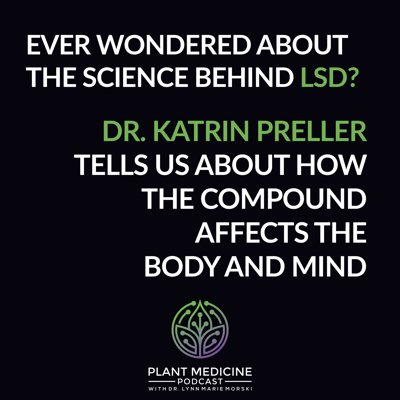LSD Scientific Research with Dr. Katrin Preller
- 35
- 01/01/2020

Summary
Dr. Katrin Preller has worked for the University of Zurich where she investigated the neurobiological long-term effects of cocaine, MDMA, and heroin use. She also investigated the use of psychedelics on self-perception and social cognition at the neuro-psychopharmacology and brain imaging lab. She was appointed as the junior group leader at the University of Zurich and holds a position as a visiting assistant professor at Yale University.
In today’s scientific research episode, Dr. Preller breaks down what is known about LSD and discusses her clinical studies. Because of its complicated molecular structure, LSD stimulates more serotonin and dopamine production than many other psychedelics. Dr. Preller describes what past and ongoing studies have discovered concerning LSD’s effect on different receptors on the subjective-behavioral and neurological levels.
While Dr. Preller’s research examines the neurological effects of LSD, it also focusses on social cognition. Her findings indicate that certain psychedelics can reduce feelings of social exclusion and increase empathy. This has significant implications for possible use in treating depression. Dr. Preller also discusses how various doses of LSD may affect a person’s creativity as well as certain aspects of brain connectivity.
In today’s scientific research episode, Dr. Preller breaks down what is known about LSD and discusses her clinical studies. Because of its complicated molecular structure, LSD stimulates more serotonin and dopamine production than many other psychedelics. Dr. Preller describes what past and ongoing studies have discovered concerning LSD’s effect on different receptors on the subjective-behavioral and neurological levels.
While Dr. Preller’s research examines the neurological effects of LSD, it also focusses on social cognition. Her findings indicate that certain psychedelics can reduce feelings of social exclusion and increase empathy. This has significant implications for possible use in treating depression. Dr. Preller also discusses how various doses of LSD may affect a person’s creativity as well as certain aspects of brain connectivity.
In This Episode
• The implications of LSD’s molecular structure and chemical composition
• What the research says about the lack of addictive potential of LSD
• Possible effects of psychedelics on social cognition
• The links between LSD and working memory
• The difference between micro-dosing and regular-dosing on stimulating creativity
Quotes
“It is basically impossible to get addicted to LSD just because you can’t use it on a daily basis.” [6:05]
“We are very interested in how psychedelics can modify social cognition. It is a big part of human life in general. It is also a key criterium for psychiatric diagnosis.” [9:42]
“What we have seen with LSD is that there is a blurring between the perception of oneself and the perception of other people.” [17:02]
“Research on these compounds has reemerged recently. There are still very few studies out there. We definitely need more studies to be able to answer all these open questions.” [32:24]
“We are very interested in how psychedelics can modify social cognition. It is a big part of human life in general. It is also a key criterium for psychiatric diagnosis.” [9:42]
“What we have seen with LSD is that there is a blurring between the perception of oneself and the perception of other people.” [17:02]
“Research on these compounds has reemerged recently. There are still very few studies out there. We definitely need more studies to be able to answer all these open questions.” [32:24]
Links
* The Psychedelic Medicine Podcast has allowed the Psychedelic Medicine Association to post episodes as an educational resource, and in return the PMA is hosting the podcast show notes.


